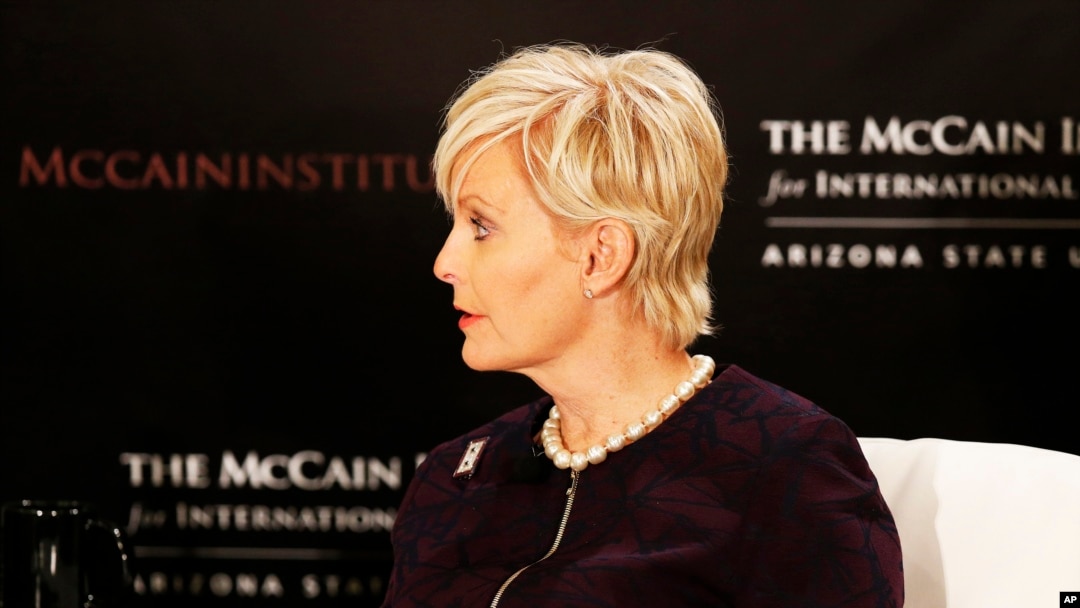Amnesty International has recommended decriminalizing the sex trade as a way to improve the human rights of sex workers and lessen the risk of their human rights being violated. The rights group says decriminalization would mean that sex workers are not forced to live outside the law and would no longer be seen and treated as “criminals” – making them less at risk of aggressive police tactics and enabling them to demand better protection from authorities.
Many human rights advocates, however, say Amnesty’s proposal instead legalizes the exploitation of these workers. There are alternatives, according to Cindy McCain, who heads the Human Trafficking Advisory Council at the McCain Institute for International Leadership and has done groundbreaking work in putting an end to human trafficking.
“Adult sex workers most generally started out as children…all too often when they begin all this is they’re either sex slaves, number one; number two, they have no other way to support a family at the age of 12 or 13 or they’re kidnapped and…they wind up in the sex trade and the next thing you know they’re 30-years - old and they’ve been doing it since they were 12," McCain told VOA, adding that "legalizing it is not the way to go, criminalizing the customers is what we need to take a look at now in a very harsh way.”
In a recent op-ed piece for The Washington Post newspaper, McCain says the industry is not safe, with sex workers in many countries facing untold violence. She says Amnesty’s proposal tells women, men and children that sex work is a safe and accepted choice and that those who pay for sex with them have the human right to do so. She calls on authorities to go after the sex traffickers, saying they are the criminals.
“They need to grab for the cartels that are taking these girls and forcing them into this kind of trade. These are cartels. This is organized crime. It is child abuse when you start talking about underage minors. We need to go after the guys that are actually doing this, as well as the customers. These are the same people that traffic animal parts… drugs…guns and they traffic human beings," she said.
McCain said she has traveled to Georgia and other countries in that region where organized crime is heavily involved in the sex trade.
In Georgia, Kosovo and other post-conflict countries, McCain says the decimation is extensive – one does not see many younger women because they have been forced into the sex trade and removed from the country in which they were born. She says in a country like Kosovo, one sees the remnants of what war does to sex trafficking and the result of it.
In Ukraine and other countries that are in conflict, McCain says many women who have not fled or been able to get out with their families will at some point be forced into sex trafficking. She says the effects of war on a country are severe, but the effects on women and children particularly are extremely severe. They are the frontline in all this, she says, and generally bear the brunt.
The migrant crisis unfolding in Europe is a tragedy and no different, says McCain, adding that the people are running for many reasons, be it war or economic factors, and those reasons are legitimate; but with that, she says, comes an element, and that’s where the sex trafficking comes in. McCain says no little girl says, “Gee, I’m 10 years old and I want to be a prostitute.”
Amnesty International says criminalizing the sex trade has increased sex workers’ vulnerability to violence and infringed on their human rights.
Amnesty says it chose to advocate for decriminalization after consulting sex workers, survivor and abolitionist groups, HIV agencies, women’s and LGBTI rights activists, indigenous women’s groups, anti-trafficking groups and leading academics. Amnesty also stresses that it does not consider a trafficked woman who is forced to sell sex to be a ‘sex worker.’
McCain and other human rights advocates argue that decriminalizing sex work puts those in the industry in greater danger by giving no authority to go after those who exploit others for personal profit; they say such a policy would be a step backward in the fight against human trafficking worldwide.


